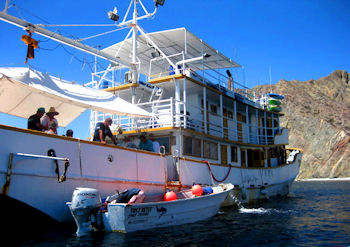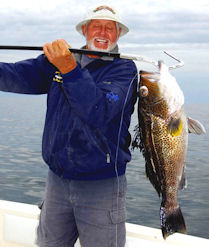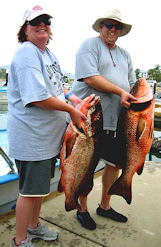 |  |
By Tom Gatch
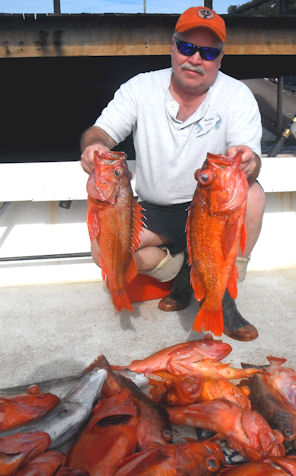
When it comes to sportfishing, the months of spring mark the beginning of an important transition period around the entire Baja California peninsula. Gradually subsiding winds from the north bode well for anglers targeting a wide variety of gamefish in Baja Norte as well as Baja Sur.
While excellent bottom fishing for tasty deepwater rockfish species along the northern Pacific coast is still almost as productive as it is during the colder months of winter, this season also fosters the reawakening of activity much closer to the surface. And when large schools of market sized squid begin to appear inshore, it is not unusual for fat homeguard yellowtail and big white sea bass to begin making an appearance from the Islas Coronados just south of the U.S. border all the way down to Bahia Asuncion in Baja Sur.
For decades, Baja’s central Pacific coast was considered a remote region most successfully traversed by hardcore, off road enthusiasts in 4-wheel drive vehicles. Even now, some areas can still be challenging to regular passenger cars. Luckily, continued improvements to the roadways combined with a much higher percentage of visitors traveling in SUVs or beefy, industrial strength trucks has opened up out of the way destinations like Bahia Asuncion, Punta Abreojos and Bahia Magdalena. Here, anglers have an opportunity to fish along a pristine shoreline where they can catch a plethora of popular inshore species like halibut, white sea bass and quality grade corvina right off the beach. Smaller private aircraft can also reach a number of these hidden places, since many of the fish camps also have small, dirt runways.
Just offshore from Bahia Vizcaino, Isla Cedros stretches 24 miles in length and, in addition to being renowned for world class calico bass and yellowtail fishing, is characterized by a ruggedly beautiful sloping terrain with a host of native flora and fauna that includes coastal scrub, juniper scrub and sand dune scrub along with dense patches of chaparral and pristine pine forest.
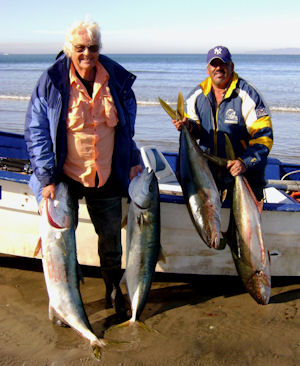
Veteran Baja angler, Jay Johnson, and Capt. Beto Zamora show off a nice catch of yellowtail caught just off the tip off the Punta Banda peninsula (Photo courtesy of Vonnys Fleet)
Sixteen miles west of Cedros Island lies the San Benitos Island group that is made up of three islands and accounts for nearly 900 hectares. This rich archipelago represents one of the most prolific havens for terrestrial wildlife and marine species this side of the Galapagos Islands off the west coast off South America.
Further south, near Bahia Magdalena, the spring season offers increasingly good fishing inside the esteros for bass, halibut, corvina and small snapper. Plenty of sierra mackerel are usually still available along with yellowtail, white sea bass and even an occasional wahoo for the truly lucky angler. There is a small launch ramp in the town of San Carlos; but boaters, particularly those with larger craft, should be advised that it is quite narrow by most standards, and at times can be in very poor condition.
Luckily, for those who prefer launching their boats in a more sophisticated venue, the Los Cabos region at the southern tip of the peninsula is close at hand and features numerous anchorages, marine facilities, launch ramps and sportfishing charters that can cater to practically every need.
This is a time of year when fishing conditions can really change from day to day. Baitfish are usually a little harder to catch, and successful fishing for many of the warm water species is still generally a few months away.
The best action is often found by drift fishing over rock piles using both bait and yo-yo style iron jigs, which usually produces a mixed bag of species like cabrilla, amberjack, various pargos, triggerfish, bonito, sierra and pompano. Offshore, these months can also offer anglers a shot at yellowfin tuna that occasionally travel with porpoise schools, sometimes within five miles of the coast.
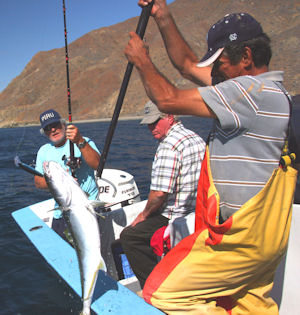
Once past San Jose del Cabo and traveling north along the Sea of Cortez, the coastline becomes sparse and arid until you reach the legendary East Cape of Baja Sur about 40 miles beyond. This region is famous for being home to such popular fishing resorts as Palmas de Cortez, Punta Colorada, Hotel Buena Vista and Rancho Leonero. Inshore and onshore fly fishing for sierra mackerel, African pompano and small roosterfish is usually productive this time of year, and those who persistently troll offshore can often pick up dorado, yellowfin tuna and possibly even a striped marlin.
A bit further north, the Baja Sur’s capitol city of La Paz stands like a jewel on the eastern coast. It is replete with colorful local history involving missionaries, pirates and a once thriving pearl industry; and has also gained a reputation for having some of the finest sportfishing on the entire peninsula. Here, several private and public boat launch facilities are available to choose from.
This is a perfect place to enjoy world-class fishing for wahoo, tuna, dorado, marlin, pargo, cabrilla and more. Visitors can also snorkel in the clear, turquoise waters with playful porpoise and sea lions, or scuba dive with hammerhead sharks and giant manta rays. There are several prominent and highly qualified outfitters who work out of the area, and provide access to the islands nearby.
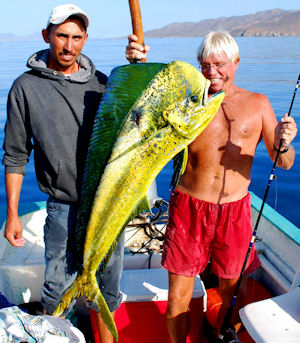
While not exactly large tourist hubs, there are several smaller towns such as Loreto, Mulege, Punta Chivato and Santa Rosalia up the coast from La Paz where launching facilities, basic accommodations and fishing charters are readily available. These places can also be extremely productive areas to fish for yellowtail, cabrilla and pargo during the spring. The same can be said about Bahia de Los Angeles further to the north, but this particular area is located at the peninsula’s midriff and is occasionally subject to strong springtime winds that can sometimes keep anglers off of the water for days at a time.
Up the coast, as Islas Encantadas lie just off the small poblado of Puetecitos; a place that also offers a small launch ramp allowing access to the excellent fishing around the structure’s rocky outcroppings. This area is a regular stopping point for panga mothership operations that work out of San Felipe and offer multi-day fishing trips in the upper Sea of Cortez.
About 50 miles beyond, the town of San Felipe is a prime destination for the thousands of shrimp lovers who flock there in the fall for the annual festival honoring the popular Crustacean. The port is also a point of departure for long range sportfishing operations. A well made municipal ramp and commercial basin provides access for boats of practically any size. Over past decades, the construction of inshore artificial reefs in the area has greatly enhanced local fishing opportunities for catching species like, orangemouth corvina, pinto bass and other members of the croaker family during spring.
Baja California can provide great fishing almost any time of year. But the months of March, April and May offer some particularly fine angling opportunities. And the best news is …the action will only get better as the year progresses. One thing is certain; it’s definitely time to pull out your fishing gear and get your line wet!
